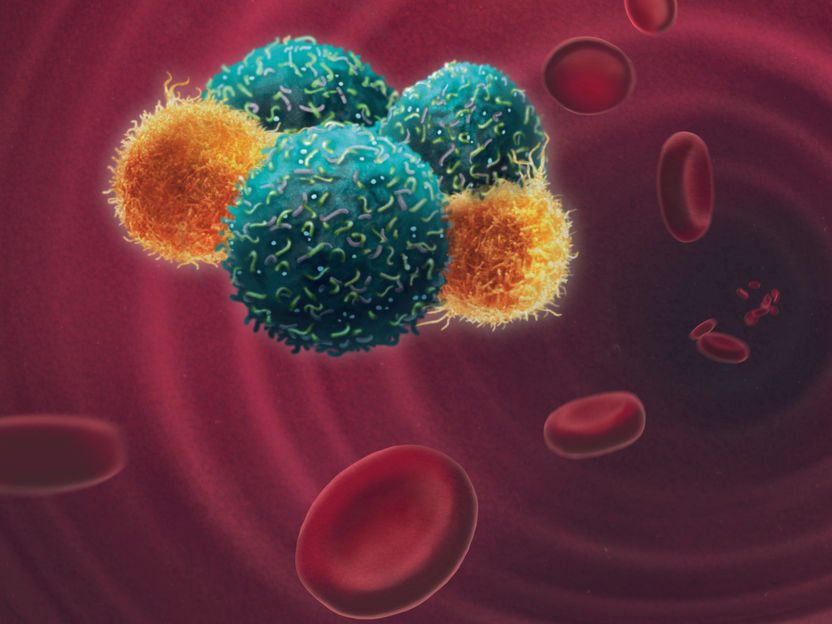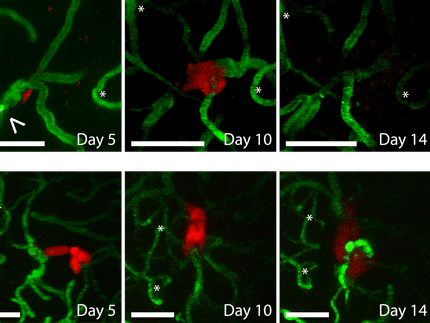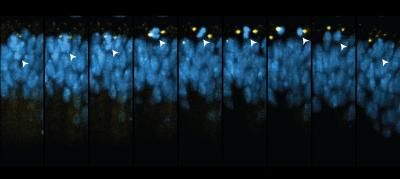Escort service: The role of immune cells in the formation of metastases
tumor cells use a certain type of immune cells, the so-called neutrophils, to enhance their ability to form metastases. Scientists have deciphered the mechanisms of this collaboration and found strategies for blocking them. This is reported by researchers from the University of Basel and the University Hospital of Basel in the scientific journal "Nature".

Artistic representation of circulating tumor cells traveling in the bloodstream escorted by neutrophils. Through this interaction, neutrophils are able to enhance the metastatic ability of circulating tumor cells.
University of Basel
A better understanding of the features that define the interplay between cancer cells and immune cells is key to identifying new cancer therapies. Yet, focus is often given to those interactions that occur within the primary tumor and its microenvironment, while the role of immune cells during cancer dissemination in patients remains largely uncharacterized.
For example, certain immune cells, the so-called neutrophils, often enter into an alliance with tumor cells that contributes significantly to the development of metastases. This was found by Prof. Nicola Aceto's interdisciplinary research team at the Department of Biomedicine of the University of Basel and the University Hospital of Basel.
Neutrophils escort circulating tumor cells
Circulating tumor cells (CTCs) are cancer cells that leave a primary tumor and enter the bloodstream, on their way to distant organs. These CTCs are regarded as precursors of metastases. They can be found in the blood of patients as single cells, cell clusters or in groups with neutrophils. The researchers discovered that CTCs in close contact to neutrophils proliferate much more than other circulating cancer cells.
“Surprising is that the patient’s own neutrophils act by protecting CTCs in circulation, allowing CTCs to more efficiently seed metastasis”, states Prof. Aceto. Indeed, the presence of CTC-neutrophil clusters in the bloodstream also correlates with a poor prognosis of breast cancer patients.
Blocking the alliance between tumor cells and neutrophils
“We undertook a number of experiments to fully characterize CTC-neutrophil clusters from patients and mouse models, aiming to find strategies to suppress their ability to form metastasis,” says Prof. Aceto, holder of an ERC starting grant and SNSF professorship. To this end, the researchers combined state-of-the-art single cell sequencing techniques, microfluidic technologies and genetic knockout experiments to gain insights into the biology of CTC-neutrophil clusters. They found that the neutrophils enhance the metastasis-seeding ability of CTCs by releasing specific messenger substances, such as cytokines. When in turn this release of cytokines was blocked, the pro-metastatic effects of neutrophils were abrogated.
Altogether, the researchers were able not only to uncover the role of CTC-neutrophil clusters, but also to identify their vulnerabilities. These results may lead to the development of new anti-metastatic drugs.
Original publication
Barbara Maria Szczerba, Francesc Castro-Giner, Marcus Vetter, Ilona Krol, Sofia Gkountela, Julia Landin, Manuel C. Scheidmann, Cinzia Donato, Ramona Scherrer, Jochen Singer, Christian Beisel, Christian Kurzeder, Viola Heinzelmann-Schwarz, Christoph Rochlitz, Walter Paul Weber, Niko Beerenwinkel & Nicola Aceto; "Neutrophils Escort Circulating Tumour Cells to Enable Cell Cycle Progression"; Nature; 2019
Most read news
Original publication
Barbara Maria Szczerba, Francesc Castro-Giner, Marcus Vetter, Ilona Krol, Sofia Gkountela, Julia Landin, Manuel C. Scheidmann, Cinzia Donato, Ramona Scherrer, Jochen Singer, Christian Beisel, Christian Kurzeder, Viola Heinzelmann-Schwarz, Christoph Rochlitz, Walter Paul Weber, Niko Beerenwinkel & Nicola Aceto; "Neutrophils Escort Circulating Tumour Cells to Enable Cell Cycle Progression"; Nature; 2019
Topics
Organizations
Other news from the department science

Get the life science industry in your inbox
By submitting this form you agree that LUMITOS AG will send you the newsletter(s) selected above by email. Your data will not be passed on to third parties. Your data will be stored and processed in accordance with our data protection regulations. LUMITOS may contact you by email for the purpose of advertising or market and opinion surveys. You can revoke your consent at any time without giving reasons to LUMITOS AG, Ernst-Augustin-Str. 2, 12489 Berlin, Germany or by e-mail at revoke@lumitos.com with effect for the future. In addition, each email contains a link to unsubscribe from the corresponding newsletter.


















































